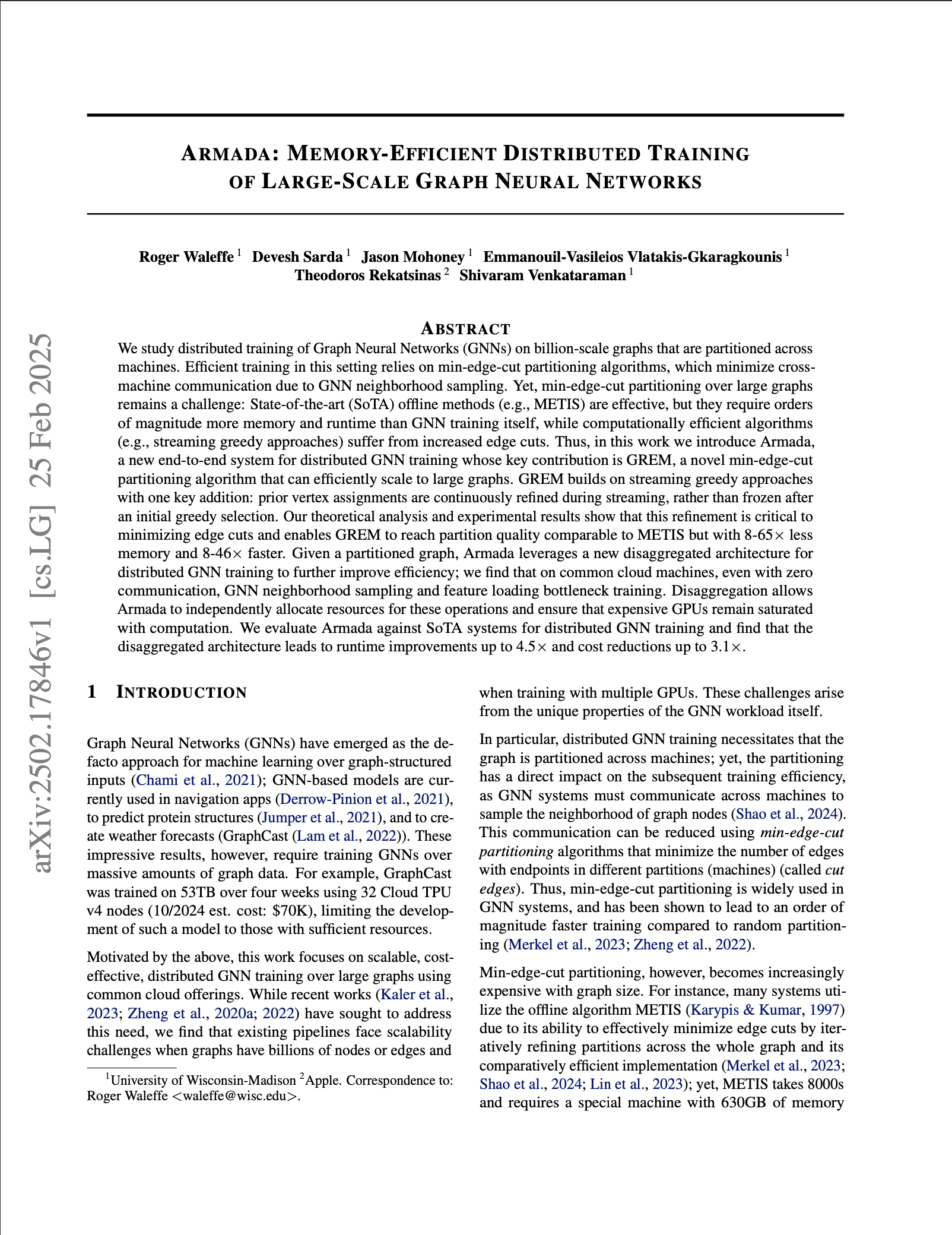
ARMADA: Memory-Efficient Distributed Training of Large-Scale Graph Neural Networks
TLDR: We propose ARMADA, a memory-efficient method for distributed training of large-scale GNNs.
Toolbox: Graph Neural Networks, Distributed Learning, High-Performance Computing
Roger Waleffe*, Devesh Sarda*, Jason Mohoney*, Emmanouil-Vasileios Vlatakis-Gkaragkounis*, Theodoros Rekatsinas*, Shivaram Venkataraman*
(Under Submission)
*:Alphabetical order; Equal contribution
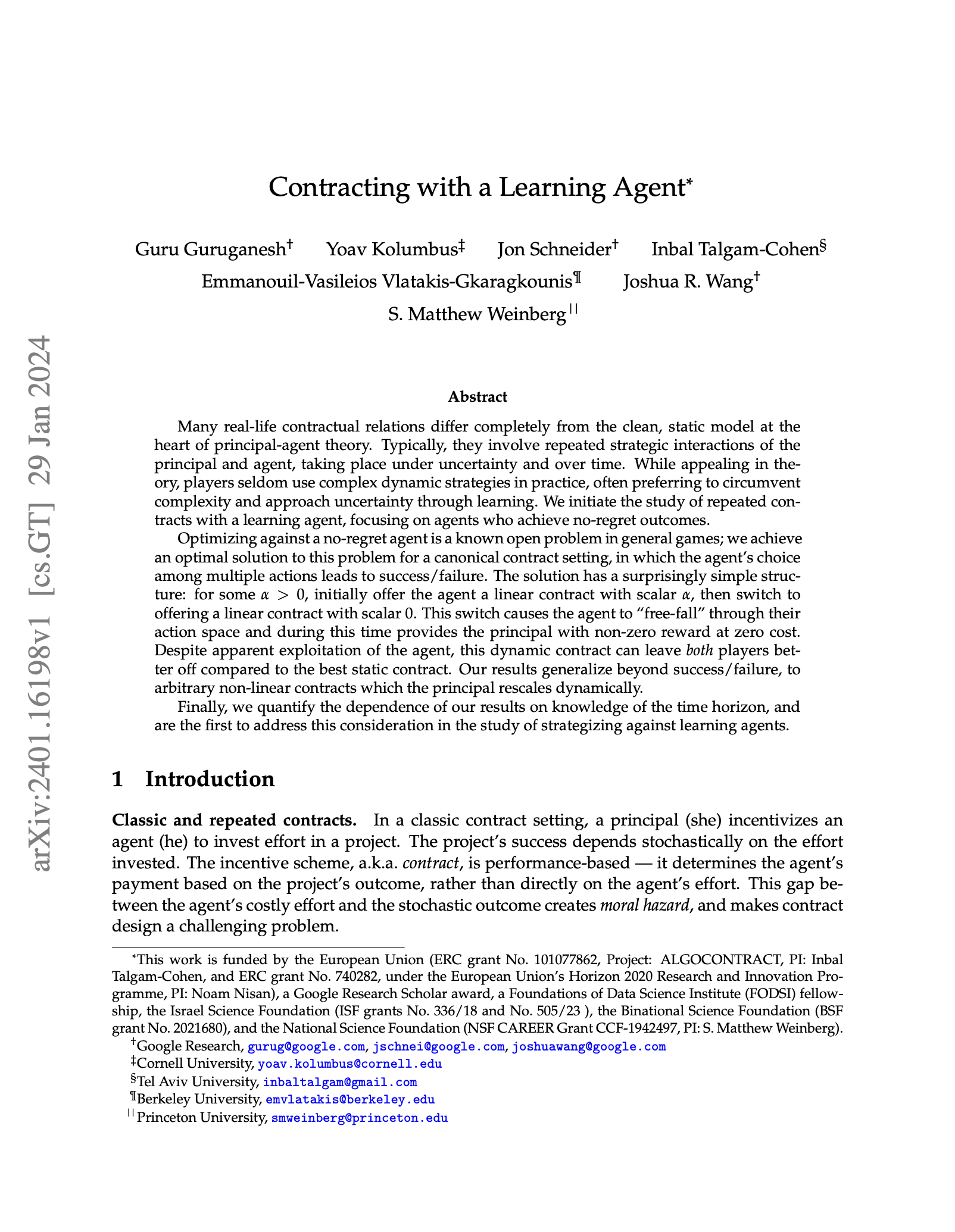
Contracting with a Learning Agent
TLDR: We study repeated contracts with a learning agent and provide an optimal solution to a canonical contract setting.
Toolbox: Game Theory, Contract Theory, No-Regret Learning
Guru Guruganesh*, Yoav Kolumbus*, Jon Schneider*, Inbal Talgam-Cohen*, Emmanouil-Vasileios Vlatakis-Gkaragkounis*, Joshua R. Wang*, S. Matthew Weinberg*
39th Conference on Neural Information Processing Systems (NeurIPS)
*:Alphabetical order; Equal contribution
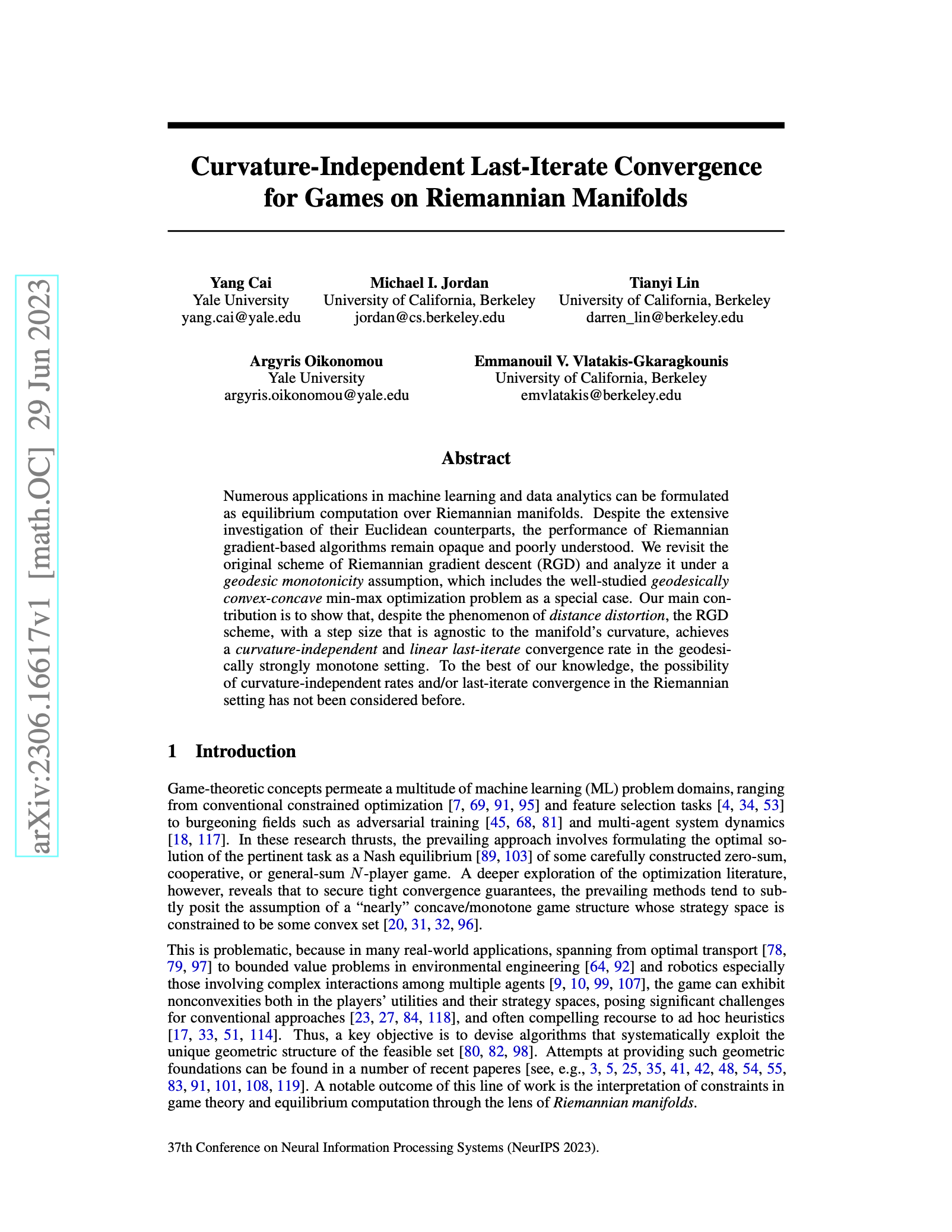
Curvature-Independent Last-Iterate Convergence for Games on Riemannian Manifolds
TLDR: Riemannian GD can compute NE with a step size that is agnostic to the underlying curvature.
Toolbox: Differential Geometry, Game Theory, Convex Optimization, Potential Analysis
Yang Cai*, Michael I. Jordan*, Tianyi Lin*, Argyris Oikonomou*, Emmanouil-Vasileios Vlatakis-Gkaragkounis*
Neural Information Processing Systems (Submitted) (NeurIPS)
*:Alphabetical order; Equal contribution
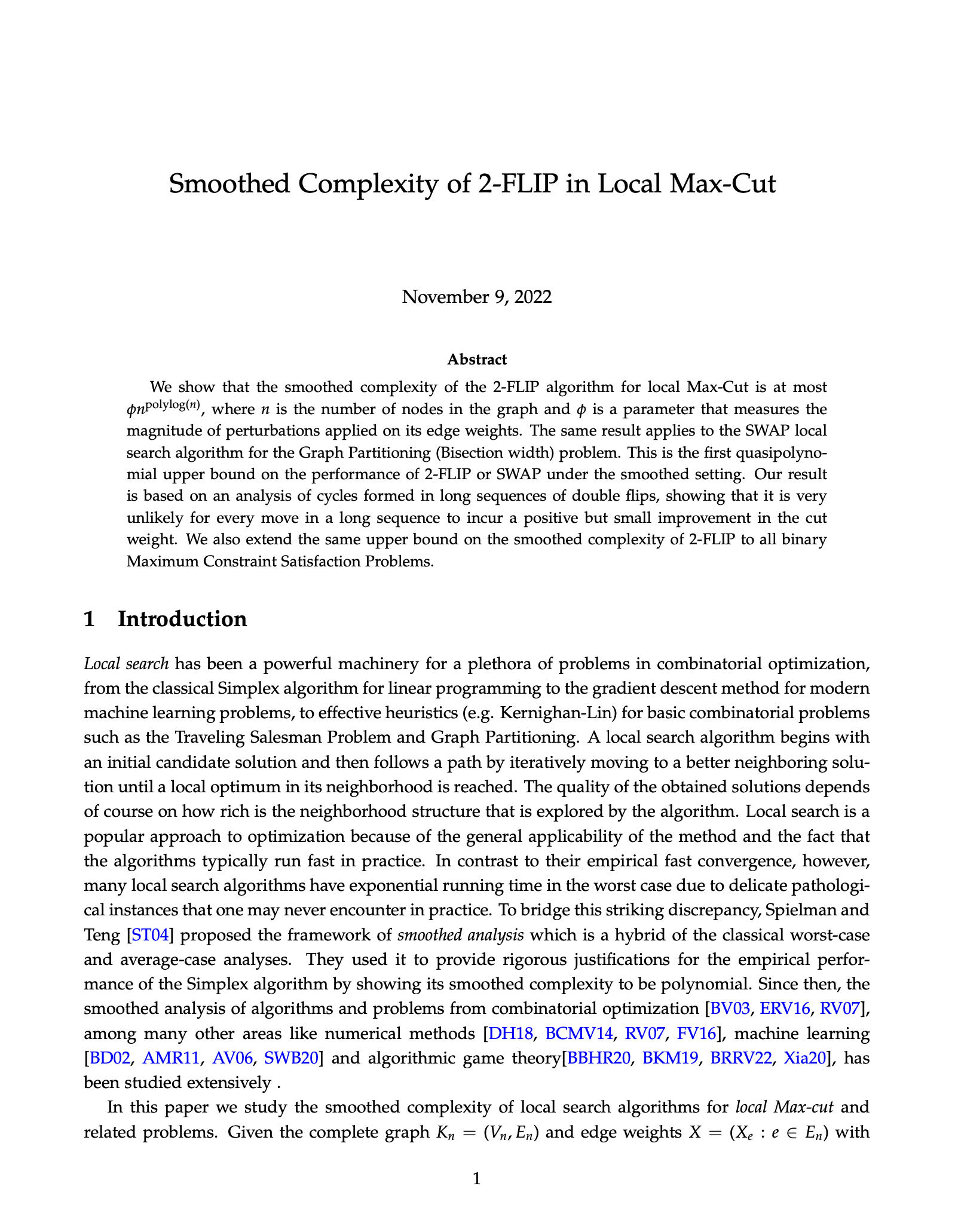
Smoothed Complexity of SWAP in Local Graph Partitioning
TLDR: Despite theoretical concerns, local search algorithms like SWAP and 2-FLIP handle provably real-world optimization tasks efficiently.
Toolbox: Smoothed Analysis, Applied Probability, Combinatorics, Graph Theory
Xi Chen*, Chenghao Guo*, Mihalis Yannakakis*, Emmanouil-Vasileios Vlatakis-Gkaragkounis*
35th ACM-SIAM Symposium on Discrete Algorithms (SODA)
*:Alphabetical order; Equal contribution
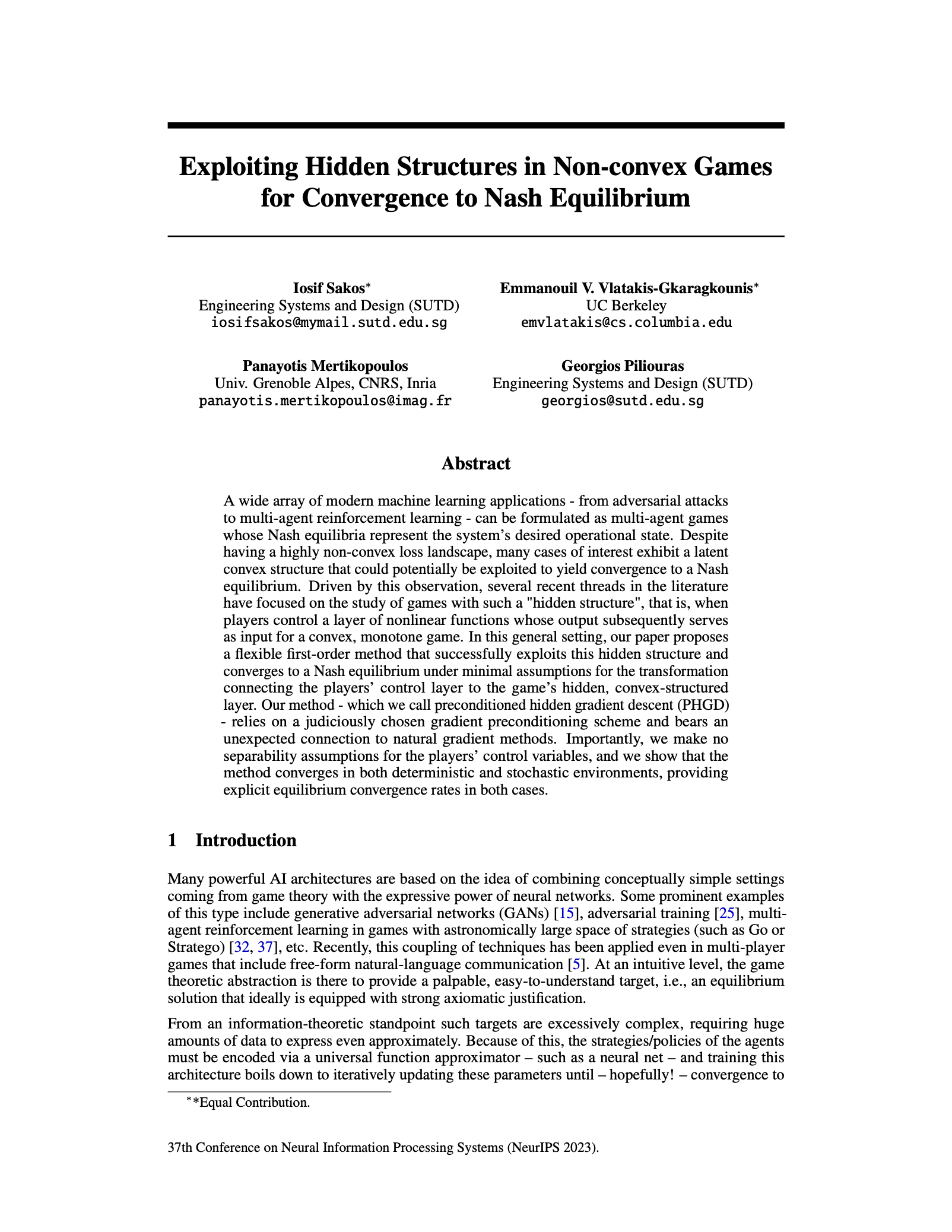
Exploiting Hidden Structures in Non-convex Games for Convergence to Nash Equilibrium
TLDR: 'Hidden gradient descent': A novel method for computing Nash equilibrium in ML complex non-convex landscapes with hidden convex cores.
Toolbox: Game Theory, Convex Optimization, Dynamical Systems
Iosif Sakos1, Emmanouil-Vasileios Vlatakis-Gkaragkounis1, Panayotis Mertikopoulos2, Georgios Piliouras2
37th Conference on Neural Information Processing Systems (NeurIPS)
1/2. Contribution order; Equal Number=Equal Contribution; Alphabetically listed within tier
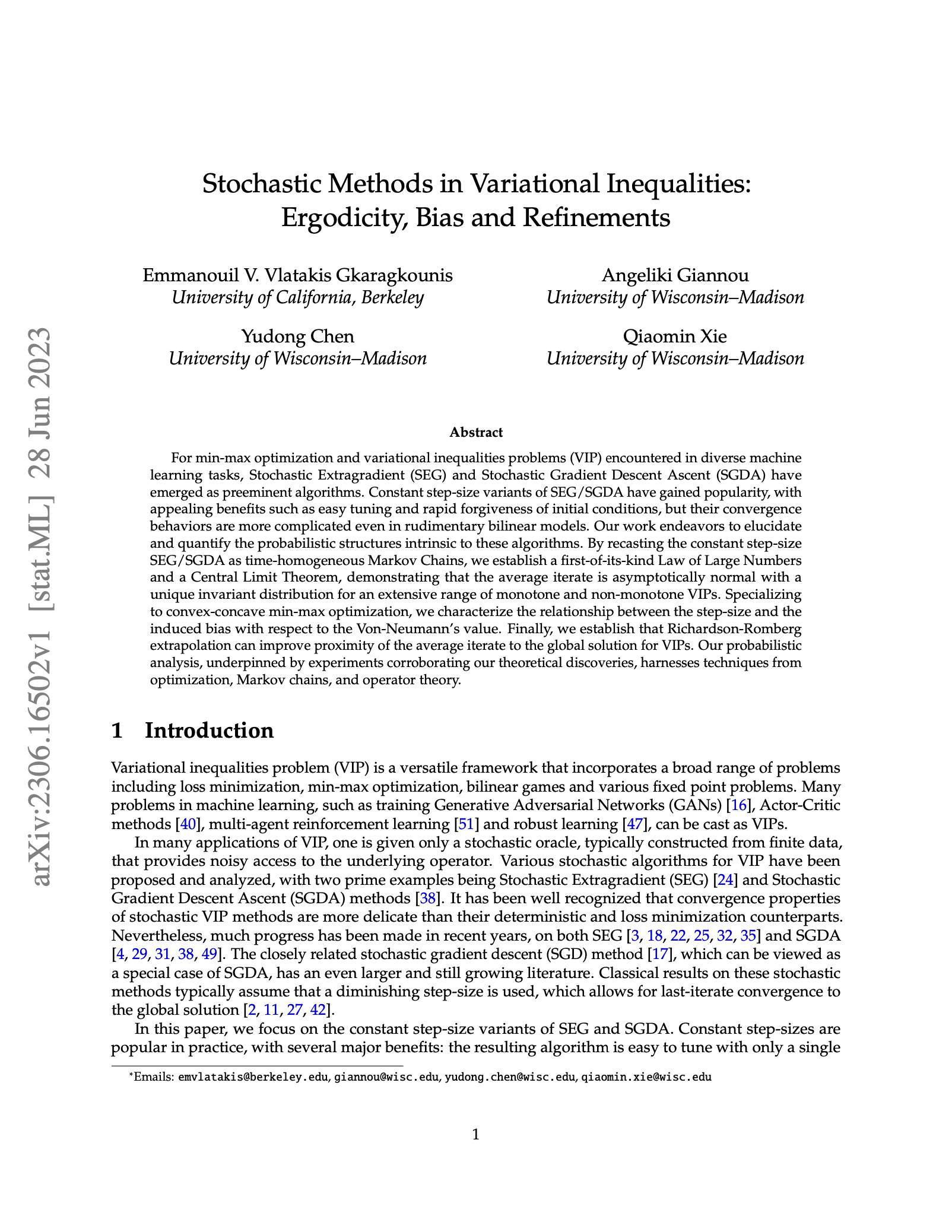
Stochastic Methods in Variational Inequalities: Ergodicity, Bias and Refinements
TLDR: Stochastic EG and GDA algorithms are governed by the Law of Large Numbers and the Central Limit Theorem and their accuracy can be boosted using Richardson extrapolation.
Toolbox: Probability, Ergodic Theory, Markov Chains, Optimization, Dynamical Systems
Emmanouil-Vasileios Vlatakis-Gkaragkounis1, Angeliki Giannou2, Yudong Chen3, Qiaomin Xie3
37th Conference on Neural Information Processing Systems (NeurIPS)
1/2/3. Contribution order; Equal Number=Equal Contribution; Alphabetically listed within tier
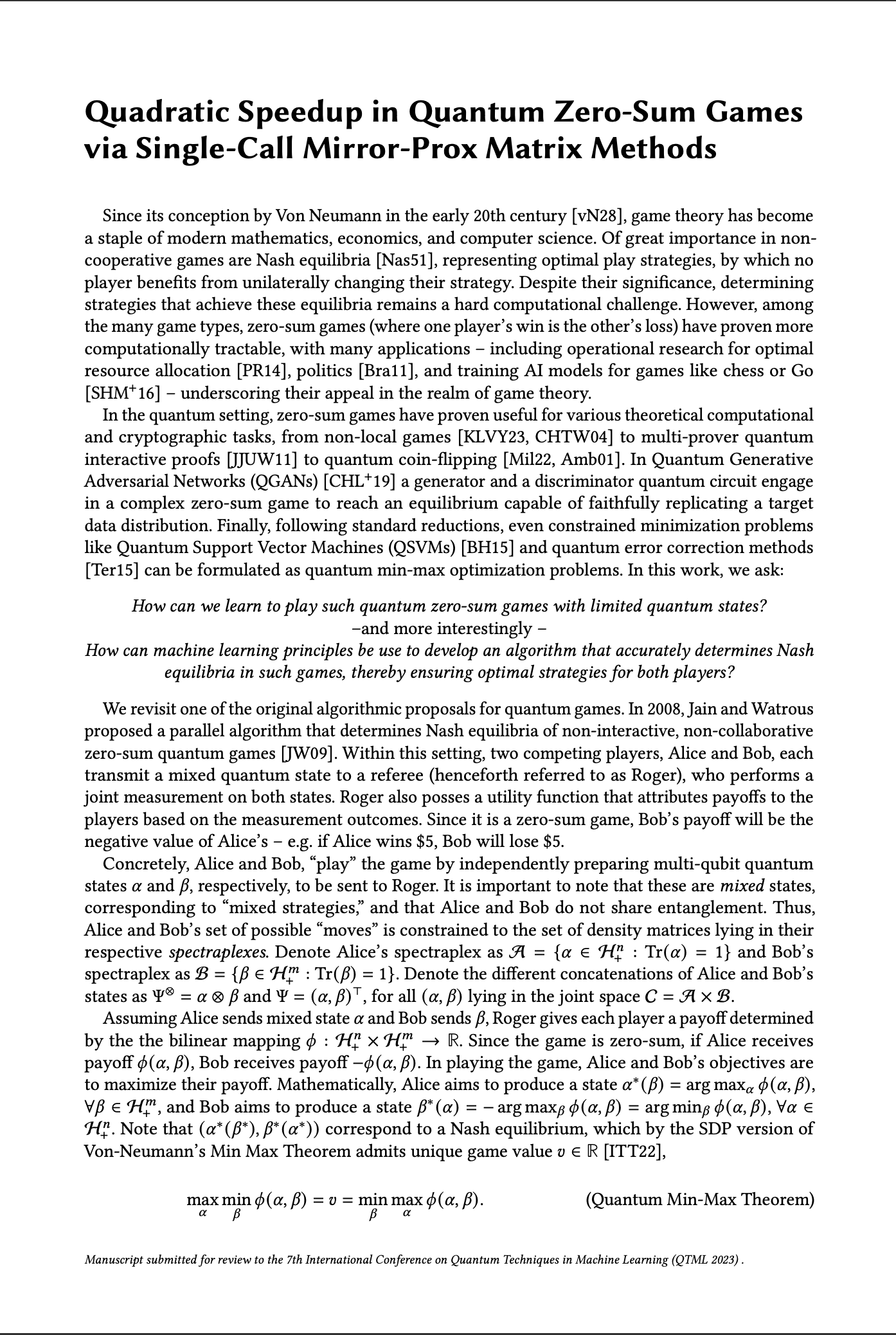
Quadratic Speedup in Finding Nash Equilibria of Quantum Zero-Sum Games
TLDR: State-of-art method for Computing Nash Equilibria in Quantum Zero-Sum Games.
Toolbox: Quantum Computing, Game Theory, Convex Optimization
Francisca Vasconcelos1, Emmanouil-Vasileios Vlatakis-Gkaragkounis1, Panayotis Mertikopoulos2, Georgios Piliouras3, Umesh Vazirani3, Michael I. Jordan3
7th Conference on Quantum Techniques in Machine Learning (QTML)
1/2/3. Contribution order; Equal Number=Equal Contribution; Alphabetically listed within tier
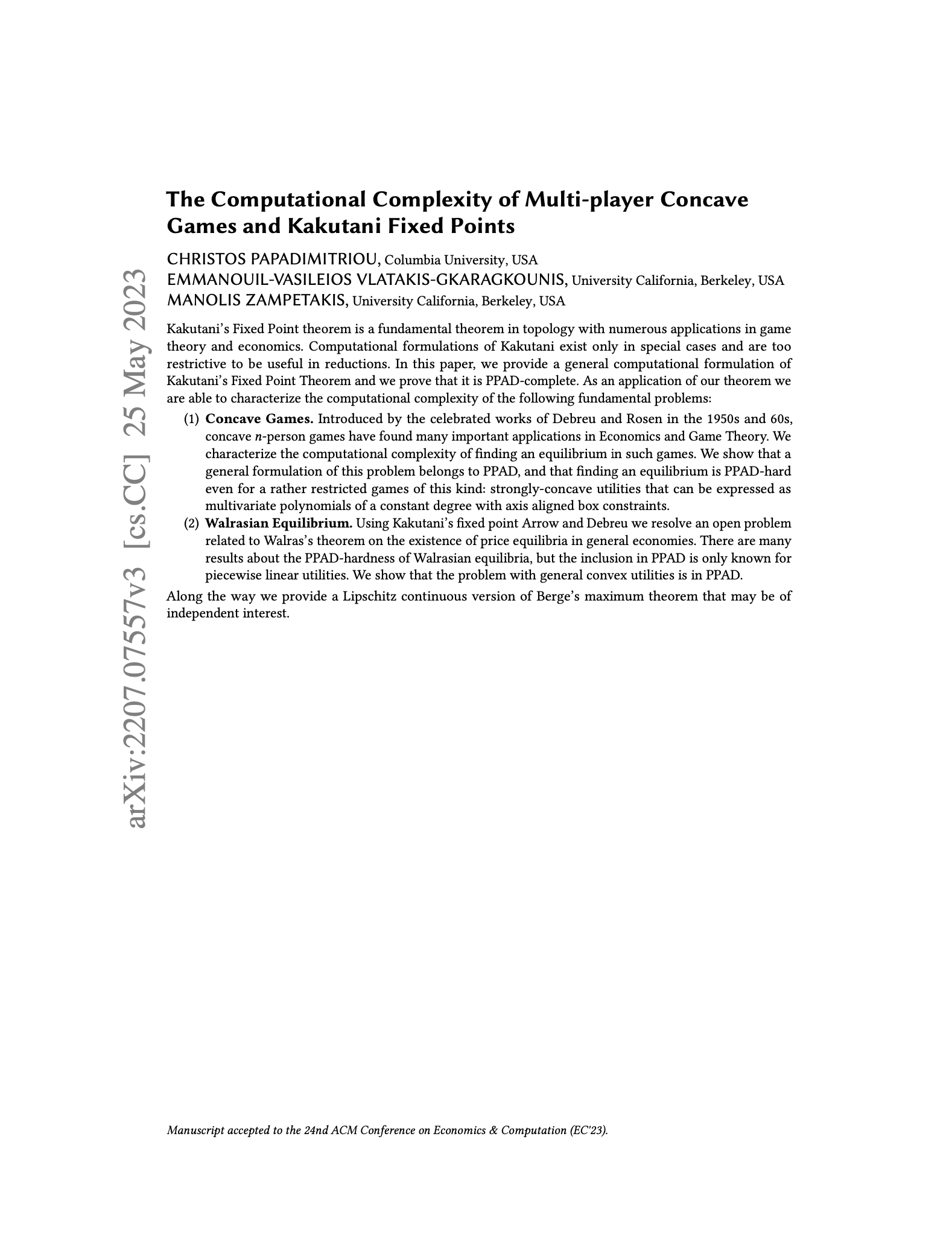
The Computational Complexity of Multi-player Concave Games and Kakutani Fixed Points
TLDR: Computing Kakutani's Fixpoints is PPAD-complete. Both Rosen-Nash Eq. in concave games and Walrasian Eq. in exchange markets share similar complexity for general utilities.
Toolbox: Computational Complexity, Game Theory, Convex Analysis
Christos Papadimitriou*, Manolis Zampetakis*, Emmanouil-Vasileios Vlatakis-Gkaragkounis*
24th ACM Conference on Economics and Computations (EC)
*:Alphabetical order; Equal contribution
[Poster] [Presentation] [Recorded Talk]

Algorithms and Complexity for Computing Nash Equilibria in Adversarial Team Games
TLDR: Computing Nash Equilibria in adversarial team games is CLS-complete.
Toolbox: Computational Complexity, Game Theory, Convex Analysis, Linear Programming
Fivos Kalogiannis*, Ioannis Anagnostides*, Ioannis Panageas*, Emmanouil-Vasileios Vlatakis-Gkaragkounis*
24th ACM Conference on Economics and Computations (EC)
Student Leading Paper / *. Equal Contribution
[Presentation] [Recorded Talk]
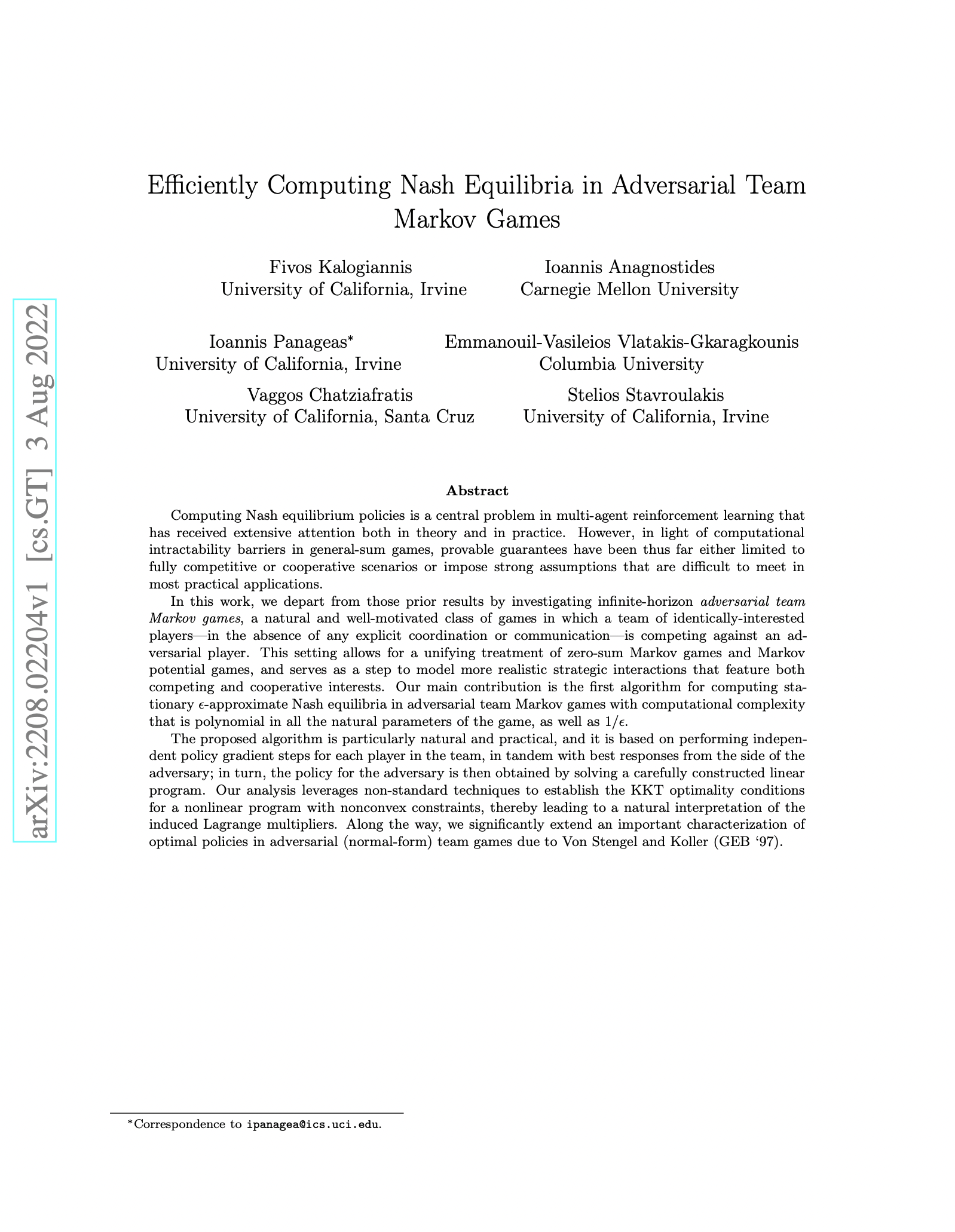
Efficiently Computing Nash Equilibria in Adversarial Team Markov Games
TLDR: In multi-agent learning, we introduce an efficient algorithm to find near-optimal strategies for teams playing against a single opponent, blending both competition and cooperation settings.
Toolbox: Reinforcement Learning, Game Theory, Non-Convex Programming
Fivos Kalogiannis1, Ioannis Anagnostides2, Ioannis Panageas2, Emmanouil-Vasileios Vlatakis-Gkaragkounis3, Vaggos Chatziafratis3, Stelios Stavroulakis3
11th International Conference on Learning Representations (ICLR)
1/2/3. Contribution order; Equal Number=Equal Contribution; Alphabetically listed within tier
[Poster] [Presentation] [Recorded Talk]

Teamwork makes von Neumann work: Min-Max Optimization in Two-Team Zero-Sum Games
TLDR: In e-sports and multi-GANs ML team games, conventional algorithms often underperform in identifying the most optimal strategies. We present a control-theory-derived approach, yielding superior results in specific scenarios.
Toolbox: Game Theory, Control Theory, Dynamical Systems
Fivos Kalogiannis*, Ioannis Panageas*, Emmanouil-Vasileios Vlatakis-Gkaragkounis*
11th International Conference on Learning Representations (ICLR)
*:Alphabetical order; Equal contribution
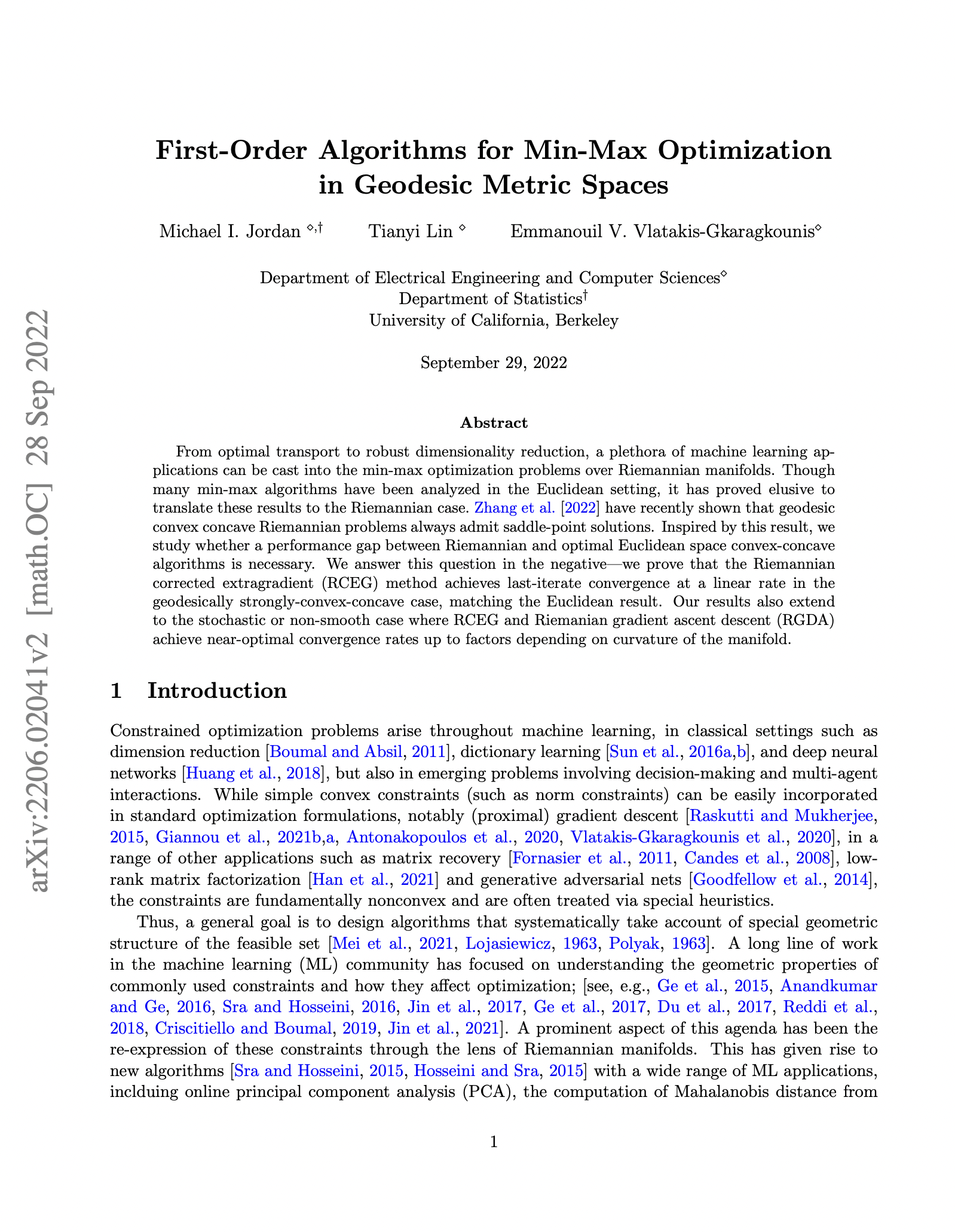
First-Order Algorithms for Min-Max Optimization in Geodesic Metric Spaces
TLDR: Addressing a century-old unsolved issue, this research reveals that Von Neumann's minimax points can be computed linearly in cases with geodesically strong convex-concave characteristics. The results match the Euclidean outcome using the Riemannian corrected extragradient (RCEG) method.
Toolbox: Differential Geometry, Game Theory, Convex Optimization, Duality Theory
Michael Jordan*, Tianyi Lin*, Emmanouil-Vasileios Vlatakis-Gkaragkounis*
36th Conference on Neural Information Processing Systems (NeurIPS)
*:Alphabetical order; Equal contribution
[Poster] [Presentation] [Recorded Talk]

On the convergence of policy gradient methods to Nash equilibria in general stochastic games
TLDR: Local Convergence Guarantees of Policy Gradient Methods in a Multi-Agent RL environment.
Toolbox: Multi-Agent RL, Convex Optimization, Applied Probability, Dynamical Systems
Angeliki Giannou*, Kyriakos Lotidis*, Panayotis Mertikopoulos*, Emmanouil-Vasileios Vlatakis-Gkaragkounis*
36th Conference on Neural Information Processing Systems (NeurIPS)
*:Alphabetical order; Equal contribution
[Poster] [Presentation] [Recorded Talk]

Near-Optimal Statistical Query Lower Bounds for Agnostically Learning Intersections of Halfspaces with Gaussian Marginals
TLDR: Defined the lower bounds for agnostically learning intersections of halfspaces with Gaussian distribution using SQ learning.
Toolbox: Boolean Learning Theory, Fourier Analysis, High-Dimensional Probability
Daniel Hsu*, Rocco Servedio*, Clayton Sanford*, Emmanouil-Vasileios Vlatakis-Gkaragkounis*
35th Annual Conference on Learning Theory (COLT)
*:Alphabetical order; Equal contribution
[Presentation] [Recorded Talk]

On the Rate of Convergence of Regularized Learning in Games: From Bandits and Uncertainty to Optimism and Beyond
TLDR: Exploration of local convergence rates for FTGL techniques in pursuit of Nash Equilibria in generic games.
Toolbox: Game Theory, Convex Optimization, Dynamical Systems, Applied Probability
Angeliki Giannou1, Emmanouil-Vasileios Vlatakis-Gkaragkounis1, Panayotis Mertikopoulos2
35th Conference on Neural Information Processing Systems (NeurIPS)
1/2/3. Contribution order; Equal Number=Equal Contribution; Alphabetically listed within tier
[Poster] [Presentation] [Recorded Talk]
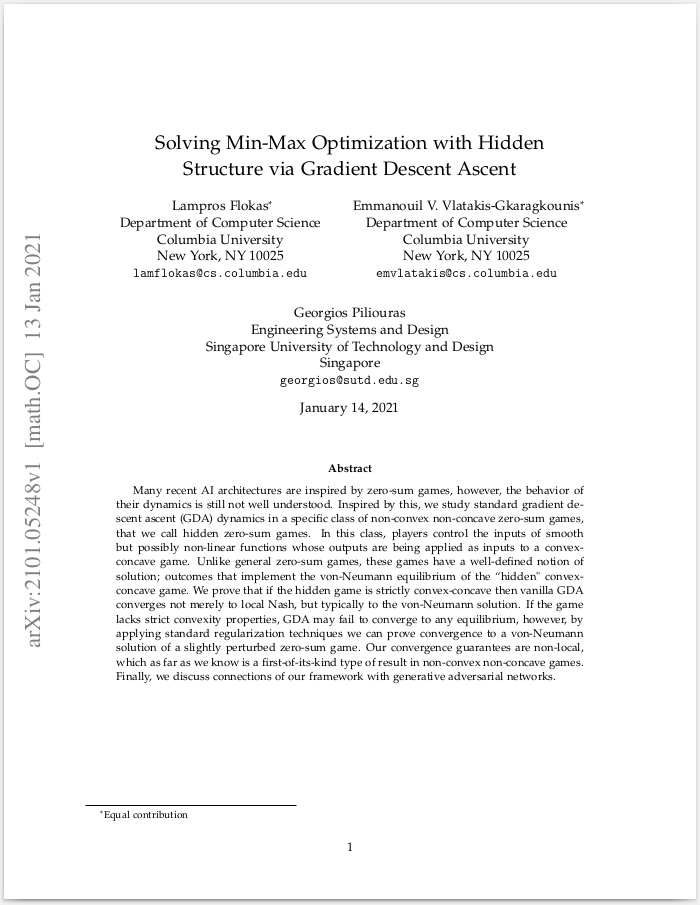
Solving Min-Max Optimization with Hidden Structure via Gradient Descent Ascent
TLDR: Exploration of convergence criteria for GDA in hidden zero-sum games and drawing connections to the training methodology of generative adversarial networks.
Toolbox: Game Theory, Dynamical Systems, Lyapunov Potentials
Lampros Flokas1, Emmanouil-Vasileios Vlatakis-Gkaragkounis1, Georgios Piliouras2
35th Conference on Neural Information Processing Systems (NeurIPS)
1/2. Contribution order; Equal Number=Equal Contribution; Alphabetically listed within tier
[Poster] [Presentation] [Recorded Talk]
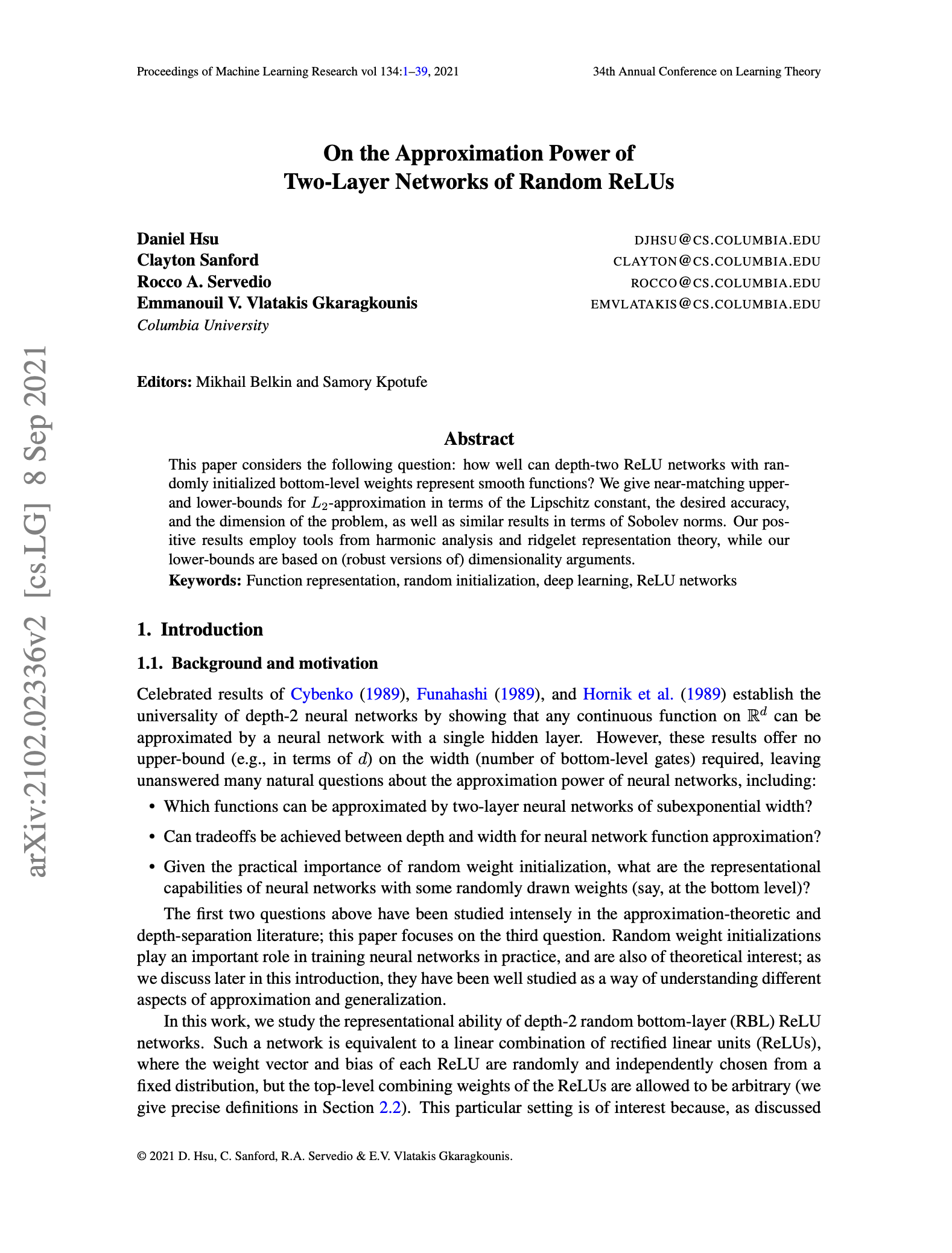
On the Approximation Power of Two-Layer Networks of Random ReLUs
TLDR: Deciphering stringent upper-lower limits for two-layered ReLU networks, possessing random weights from the outset, in the portrayal of smooth functions.
Toolbox: Deep Learning Theory, Ridgelet Fourier Analysis, Applied Probability
Daniel Hsu*, Clayton Sanford*, Rocco Servedio*, Emmanouil-Vasileios Vlatakis-Gkaragkounis*
34th Annual Conference on Learning Theory (COLT)
*:Alphabetical order; Equal contribution
[Poster] [Presentation] [Recorded Talk] [Blog Post]
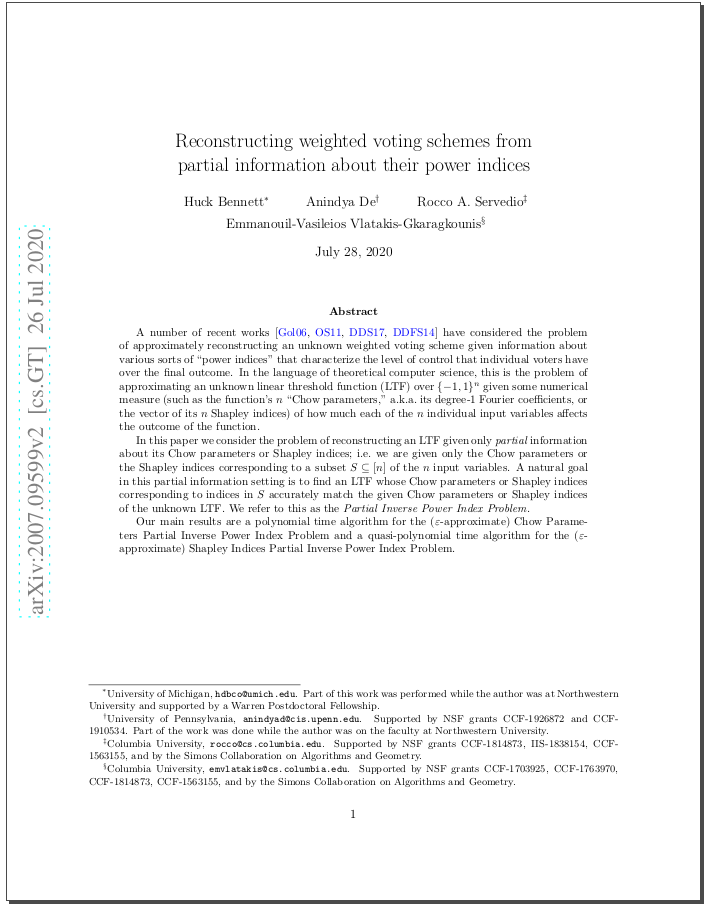
Reconstructing weighted voting schemes from partial information about their power indices
TLDR: Design of algorithms to decode voting infrastructures from fragments of data on voter influence.
Toolbox: Boolean Learning Theory, Fourier Analysis, Computational Social Choice
Huck Bennett*, Anindya De*, Rocco Servedio*, Emmanouil-Vasileios Vlatakis-Gkaragkounis*
34th Annual Conference on Learning Theory (COLT)
*:Alphabetical order; Equal contribution
[Presentation] [Recorded Talk]

Survival of the strictest: Stable and unstable equilibria under regularized learning with partial information
TLDR: 'Follow the Regularized Leader' (FTRL) algorithm reveals that a Nash equilibrium is stable and appealing with a significant probability only when it remains strictly unique.
Toolbox: Game Dynamics, Stochastic Stability Analysis, Dynamical Systems
Angeliki Giannou1, Emmanouil-Vasileios Vlatakis-Gkaragkounis1, Panayotis Mertikopoulos2
34th Annual Conference on Learning Theory (COLT)
1/2/3. Contribution order; Equal Number=Equal Contribution; Alphabetically listed within tier
[Poster] [Presentation] [Recorded Talk]
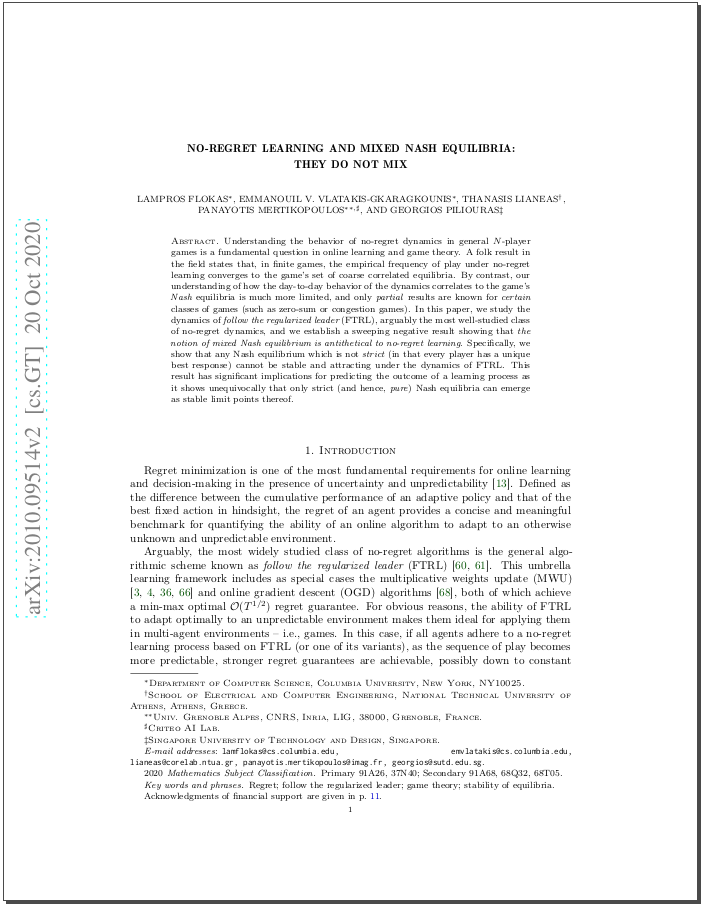
No-regret learning and mixed Nash equilibria: They do not mix
TLDR: Mixed NE are unstable under no-regret dynamics in any N-player games.
Toolbox: Game Theory, Dynamical Systems, Invariant Measures Analysis, Topology
Lampros Flokas1, Emmanouil-Vasileios Vlatakis-Gkaragkounis1, Thanasis Lianeas2, Panayotis Mertikopoulos3, Georgios Piliouras3
34th Conference on Neural Information Processing Systems (NeurIPS)
1/2/3. Contribution order; Equal Number=Equal Contribution; Alphabetically listed within tier
[Poster] [Presentation] [Recorded Talk]
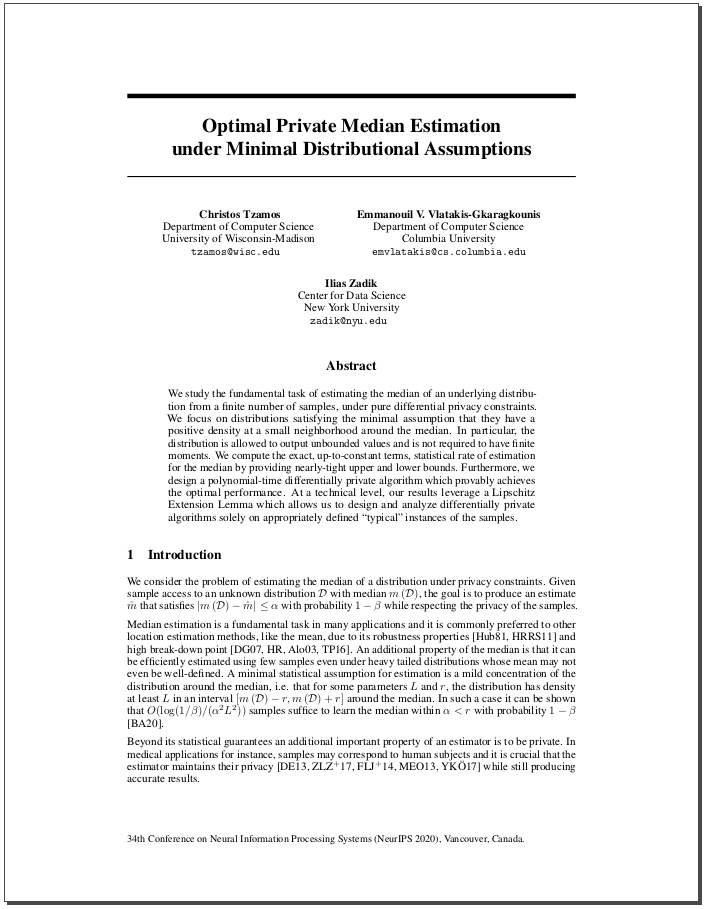
Optimal Private Median Estimation under Minimal Distributional Assumptions
TLDR: Optimal Sample and Efficient algorithm for private median estimation.
Toolbox: Differential Privacy, Algorithmic Statistics, Dynamic Programming
Christos Tzamos*, Emmanouil-Vasileios Vlatakis-Gkaragkounis*, Ilias Zadik*
34th Conference on Neural Information Processing Systems (NeurIPS)
*:Alphabetical order; Equal contribution
[Poster] [Presentation] [Recorded Talk]
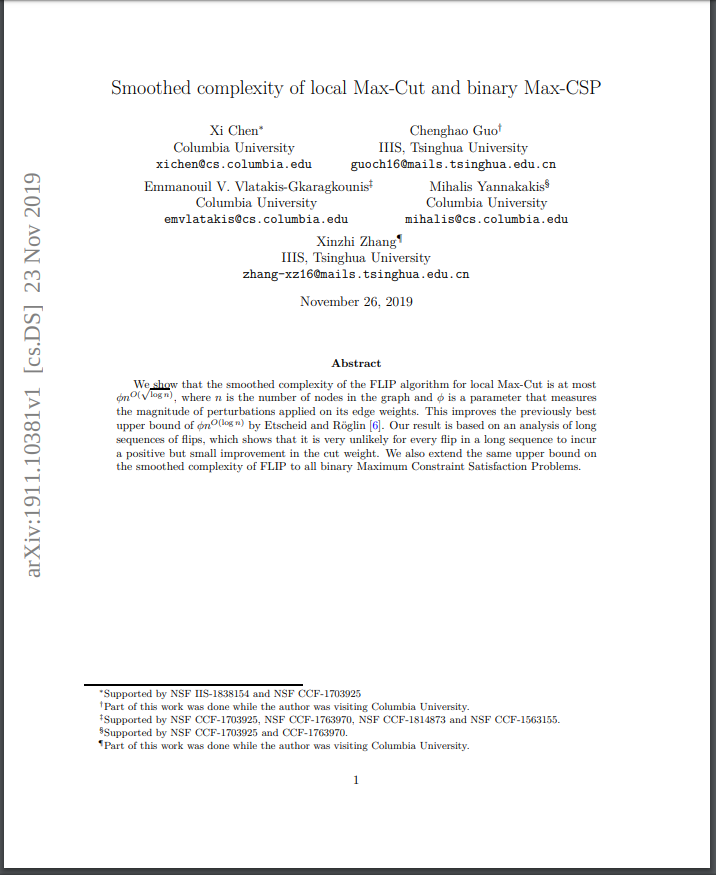
Smoothed Complexity of Local Max-Cut and Binary Max-CSP
TLDR: Despite theoretical concerns, local search algorithms based on single flips handle provably real-world optimization tasks efficiently.
Toolbox: Smoothed Analysis, Applied Probability, Combinatorics, Graph Theory
Xi Chen*, Chenghao Guo*, Mihalis Yannakakis*, Emmanouil-Vasileios Vlatakis-Gkaragkounis*, Xinzhi Zhang*
52nd Annual ACM Symposium on Theory of Computing (STOC)
*:Alphabetical order; Equal contribution

Poincaré Recurrence, Cycles, and Spurious Equilibria in Gradient-Descent-Ascent for Non-Convex Non-Concave Zero-Sum Games
TLDR: In several ML non-convex scenarios, standard GDA dynamics show behaviors that don't converge to expected game solutions, including periodic behavior and convergence to non-min-max equilibria.
Toolbox: GANs, Game Dynamics, Invariant Measures, Lyapunov Potentials, Topology
Lampros Flokas1, Emmanouil-Vasileios Vlatakis-Gkaragkounis1, Georgios Piliouras2
33rd Conference on Neural Information Processing Systems (NeurIPS)
1/2. Contribution order; Equal Number=Equal Contribution; Alphabetically listed within tier
[Poster] [Presentation] [Video]
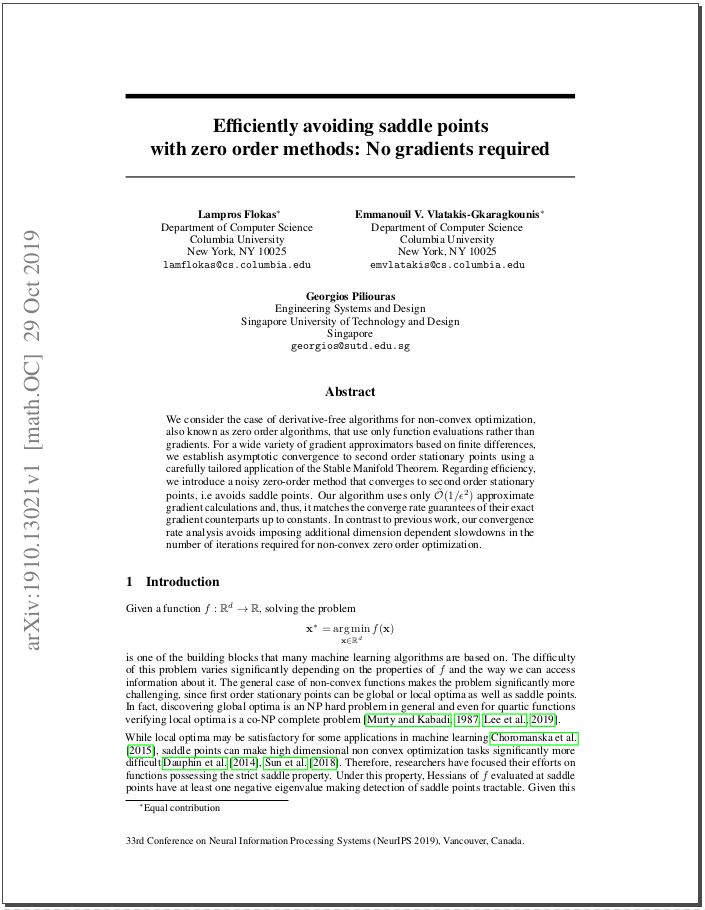
Efficiently avoiding saddle points with zero order methods: No gradients required
TLDR: A simple derivative-free method efficiently avoids saddle points.
Toolbox: Non-convex Optimization, Applied Probability, Dynamical Systems
Lampros Flokas1, Emmanouil-Vasileios Vlatakis-Gkaragkounis1, Georgios Piliouras2
33rd Conference on Neural Information Processing Systems (NeurIPS)
1/2. Contribution order; Equal Number=Equal Contribution; Alphabetically listed within tier
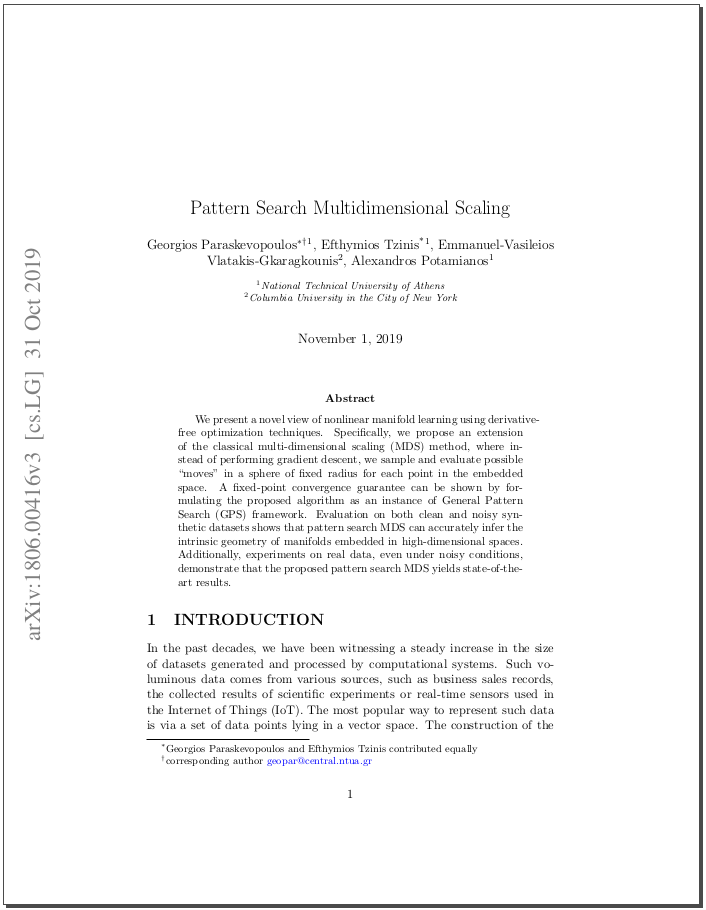
Pattern Search Multidimensional Scaling
TLDR: Derivative-free methods for multi-dimensional scaling via complex data structures.
Toolbox: Manifold Learning, Non-convex & Black-box Optimization, Local Search Heuristics
Georgios Paraskevopoulos1, Efthymios Tzinis1, Emmanouil-Vasileios Vlatakis-Gkaragkounis1, Alexandros Potamianos2
Transactions of Machine Learning Research (Submitted) (TMLR)
1/2. Contribution order; Equal Number=Equal Contribution; Alphabetically listed within tier
